Best
Versatile Bass Guitar Strings
-
Overall: Versatile tone range, well-suited for various musical genres
-
Best Feature: Available In Multiple Gauges From 40-95 To 55-110
-
TedScore™: 9/10
Best
Bass Guitar Strings Overall
-
Overall: High tension and durability with excellent string stability and playability
-
Best Feature: String gauge: Short Scale, Medium Scale, Long Scale, Extra Long Scale
-
TedScore™: 9.5/10
Best
Strings for Beginner Bassists
-
Overall: Deliver smooth and balanced sound across all registers
-
Best Feature: Offers extended lifespan and enhanced durability
-
TedScore™: 9/10
Does your bass sound dull and lifeless?
Do you struggle to tune your instrument or feel like your playing lacks that certain “oomph”? Well, fear not, dear bass players!
The solution to your musical woes may be as simple as changing your strings. But how often should you change bass strings?
Join me as we dive into the world of bass strings and discover the answer to this age-old question!
Understanding Bass Strings
Types of Bass Strings
There are two main types of bass strings: roundwound and flatwound.
Roundwound strings are the most common, producing a bright, punchy sound.
Flatwound strings, on the other hand, produce a warmer, smoother sound.
Your type of string will affect how often you need to change them. Round wound strings tend to wear out faster than flatwound strings, so you may need to change them more often.

Bass String Materials
Bass strings can be made from a variety of materials, each with its own unique sound and feel.
The most common materials used for bass strings are steel and nickel, which produce a bright and punchy tone.
Some bass players prefer flatwound strings, which are made by wrapping the strings with a flat ribbon of wire, creating a smoother and more mellow tone.
Nylon strings are also an option for bass players, though they’re less common and typically used for acoustic bass guitars.
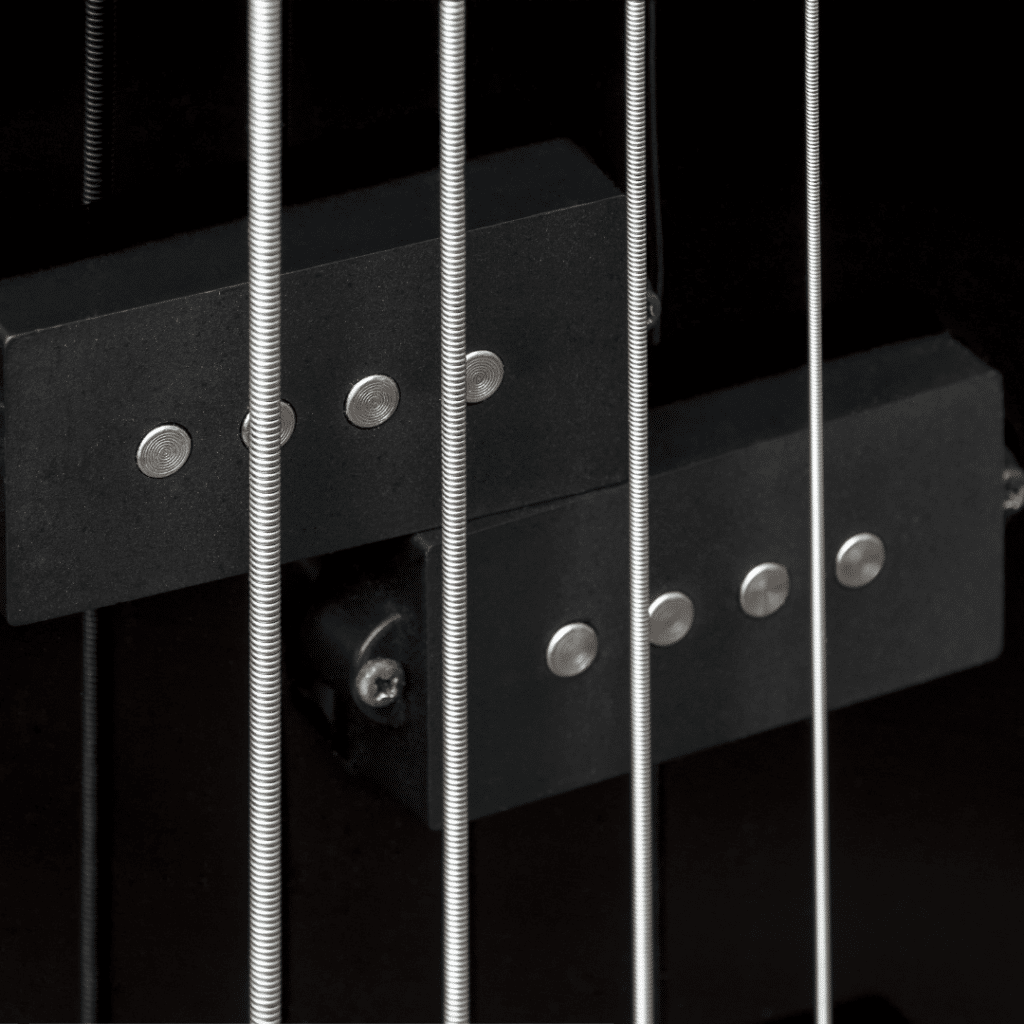
How Often Should You Change Your Bass Strings?
There’s no one-size-fits-all answer to this question, as it depends on several factors.
As a general rule, you should change your bass strings every 100 hours of playing time.
However, you may need to change them more often if you’re a professional bassist.
It’s also a good idea to change your strings if you notice any of the abovementioned signs.

Signs Your Bass Strings Need Changing

Visual Indications
One of the most obvious signs that your bass strings need changing is if they look dirty or corroded. If your strings are covered in dirt or sweat, it's time to change them.
You should also look out for any signs of wear and tear, such as unravelling or broken strings. If you notice any of these visual indications, it's time to change your strings.
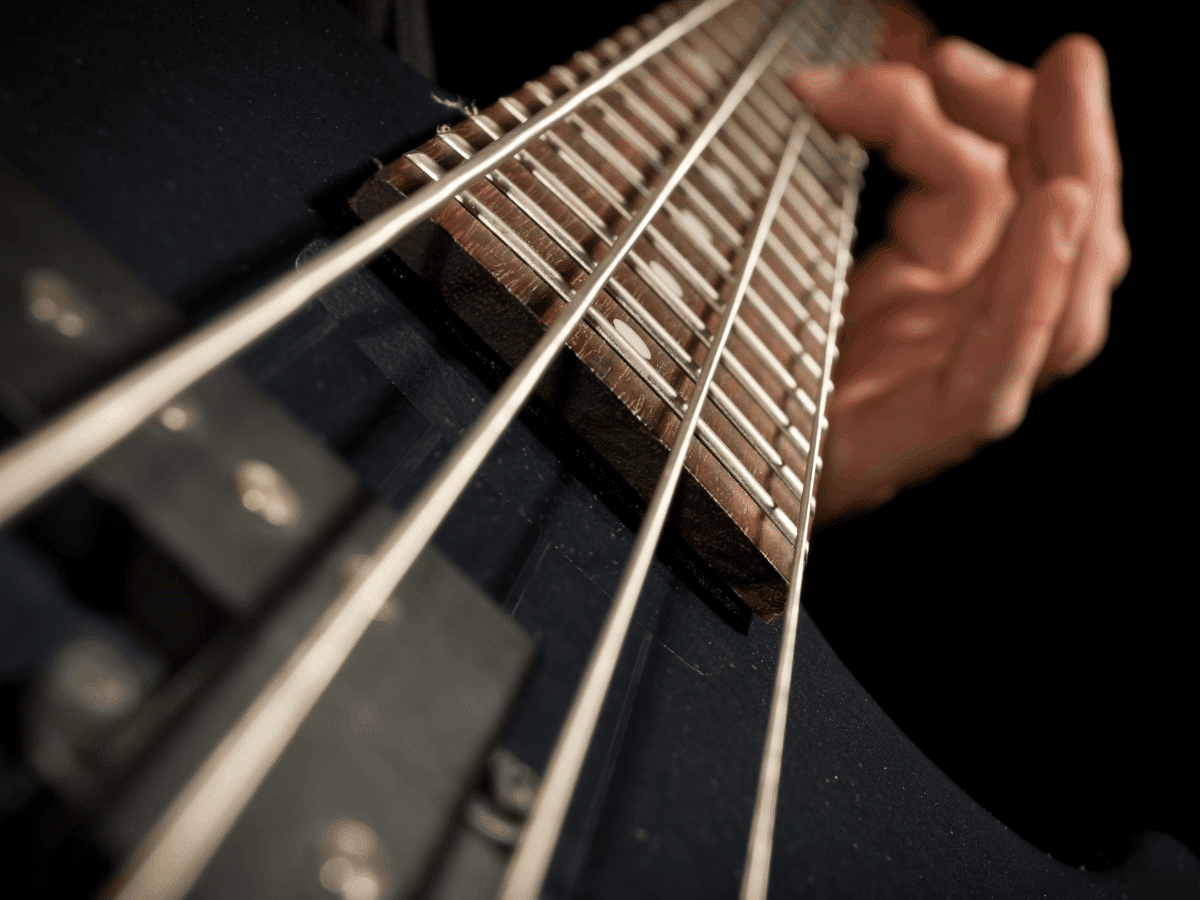
Tactile Indications
Another way to tell if your bass strings need changing is by feeling them. If your strings feel rough or gritty, it's a sign that they're worn out and need to be replaced.
You should also pay attention to how your strings feel when you play. If they feel stiff or unresponsive, it's time to change them.

Auditory Indications
When bass strings lose their smoothness and solidity, it's harder for them to vibrate at the higher harmonics that create the guitar's tone and sound.
If your strings sound dead (muffled), dull or muted, it's a sign that they're worn out and need to be replaced.
You should also listen for any buzzing or rattling sounds, which could indicate that your strings are worn and need to be changed.
Factors Influencing Bass String Lifespan
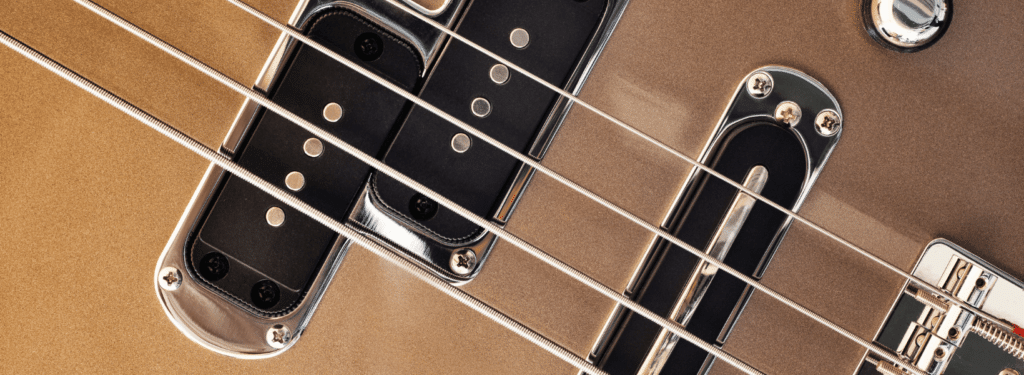
Playing Time and Style
The amount of time you spend playing your bass guitar and your playing style can significantly impact the lifespan of your strings.
If you play your bass guitar frequently, your strings will wear out faster than if you only play occasionally.
Plus, if you play with a heavy hand or use a lot of slapping and popping techniques, your strings will wear out more quickly than if you play with a lighter touch.
Environment and Climate
The environment and climate in which you play your bass guitar can also affect the lifespan of your strings.
If you play in a humid environment, your strings may rust or corrode more quickly than in a dry environment.
Similarly, if you play in a dusty or dirty environment, your strings may become coated with grime and dirt, which can cause them to wear out more quickly.
String Quality and Brand
Higher-quality strings tend to last longer than lower-quality strings.
Some brands are known for producing strings that last longer than others. Coated strings, which have a thin layer of coating that helps protect the strings from wear and tear, can also last longer than uncoated strings.How to Change Your Bass Strings
Removing Old Strings
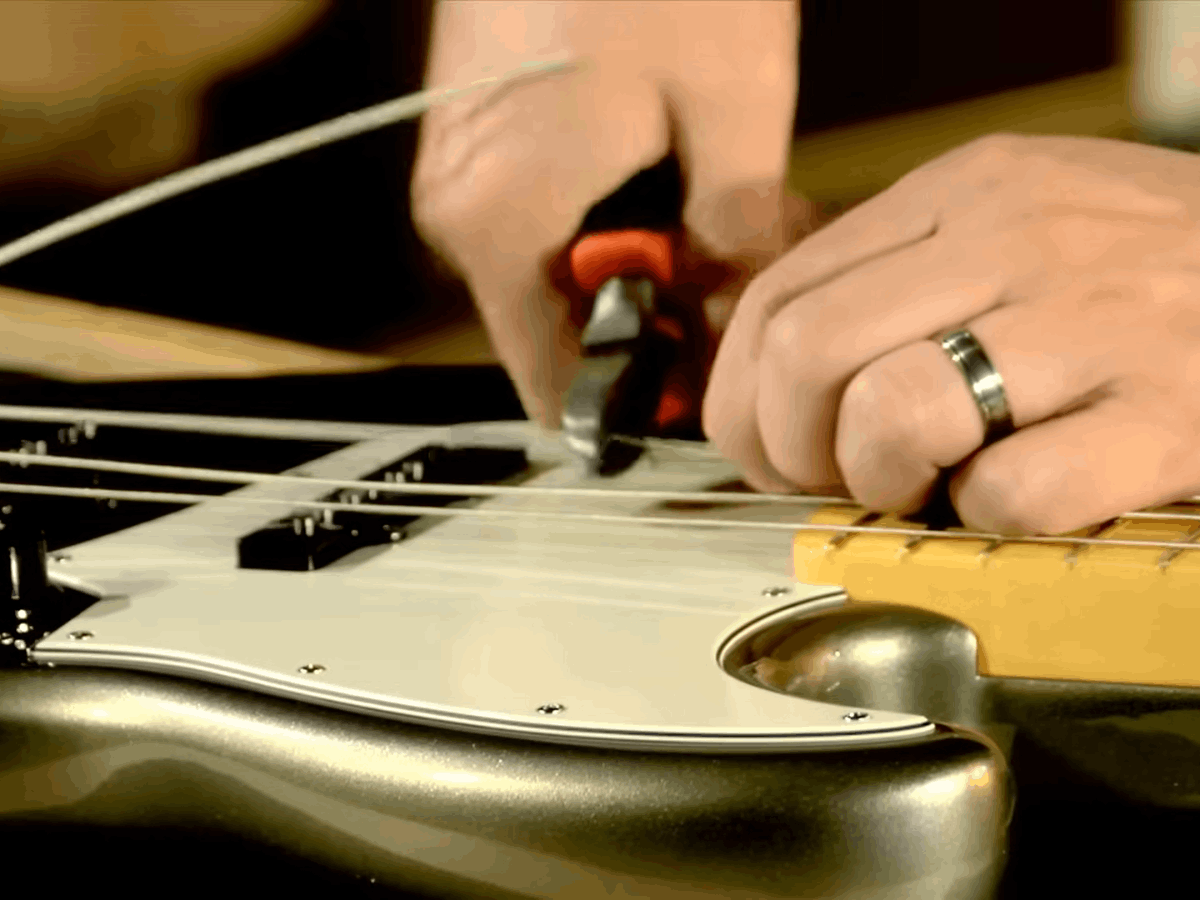
Before installing a new set of strings, it’s important to remove the old ones. Here are the steps to follow to remove your old bass strings:
- Loosen the tuning pegs for each string until they are completely slack.
- Use wire cutters to cut the strings at the bridge.
- Remove the strings from the tuning pegs and discard them.
Installing New Strings
Now that you have removed the old strings, installing the new set is time. Here are the steps to follow to install your new bass strings:

- Take your new set of bass strings and remove them from the packaging.
- Starting with the thickest string, thread it through the bridge and up to the corresponding tuning peg.
- Wrap the string around the tuning peg, leaving enough slack to wind the string around the peg several times.
- Repeat this process for each string, starting with the thickest and ending with the thinnest.
Take note: When changing bass guitar strings, it’s recommended to replace them with the same strings that were previously on the instrument to maintain the same tone and feel.
Tuning and Stretching
Once you have installed your new set of bass strings, it’s important to tune and stretch them to ensure the best possible sound.
Here are the steps to follow to tune and stretch your new bass strings:

- Tune each string to the correct pitch using a tuner.
- Stretch each string by pulling it away from the fretboard and releasing it several times. This helps to settle the strings and prevent them from going out of tune.
- Trim any excess string using wire cutters.
- Check the intonation of each string by playing the 12th fret harmonic and comparing it to the fretted note at the 12th fret. Adjust the saddle position if necessary.
Our Pick of Best Bass Guitar Strings
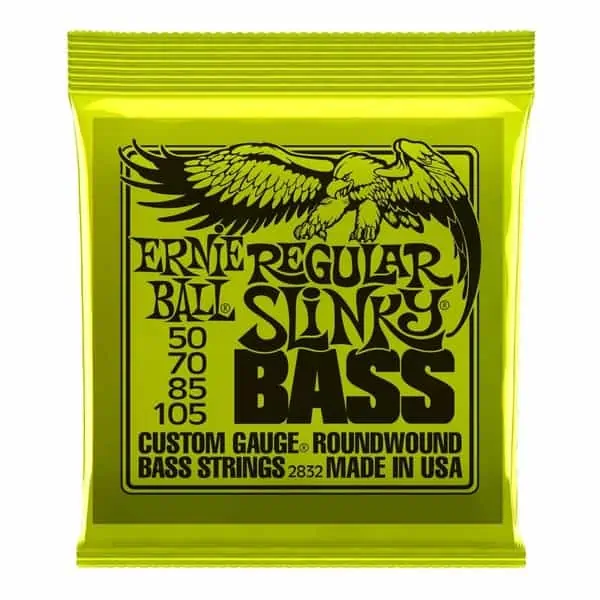
BEST OPTION FOR: Bass players who are into modern pop-rock music
STRING GAUGE: Available in multiple gauges from 40-95 to 55-110
FEATURES: The strings offer a contemporary tone, are durable, and come in many gauges
Ernie Ball Regular Slinky Nickel Bass Guitar Strings 50-105
When you check the price above, you’ll see there are loads of great places to buy this item. Our personal favorite is Gear4music.
It is the largest music retailer in the UK and fast becoming the most respected online music shop in the US too. Their customer service is excellent, they have competitive prices, really fast shipping, and usually have the longest guarantee.
Most professional musicians use Gear4music, so there is no reason why you shouldn’t too!
- Bright tones
- Durable
- Low price
- No vintage tones
The professional musician who wrote this article combined many things,
from the product build, manufacturer’s reputation through to feedback
from other users, to create our famous TedScore™.

BEST OPTION FOR: People who enjoy music from the 70s
STRING GAUGE: Available in different lengths and gauges; set for bass guitars with five strings
FEATURES: The strings produce vintage sound with brighter and deeper tones than traditional strings
Rotosound RS77LD Jazz Bass 77 Flatwound Bass Guitar Strings, 45-105
When you check the price above, you’ll see there are loads of great places to buy this item. Our personal favorite is Gear4music.
It is the largest music retailer in the UK and fast becoming the most respected online music shop in the US too. Their customer service is excellent, they have competitive prices, really fast shipping, and usually have the longest guarantee.
Most professional musicians use Gear4music, so there is no reason why you shouldn’t too!
- Durable
- Vintage tones
- Contemporary sound
- Expensive
The professional musician who wrote this article combined many things,
from the product build, manufacturer’s reputation through to feedback
from other users, to create our famous TedScore™.

BEST OPTION FOR: Players who enjoy more than one type of music genre
STRING GAUGE: Four-string, five-string, and six-string gauges are available
FEATURES: The bass strings have a midrange clarity and produce harmonic and rich sound
Daddario NYXL4095, Bass Gtr String Set Long Scale Super Light 40-95
When you check the price above, you’ll see there are loads of great places to buy this item. Our personal favorite is Gear4music.
It is the largest music retailer in the UK and fast becoming the most respected online music shop in the US too. Their customer service is excellent, they have competitive prices, really fast shipping, and usually have the longest guarantee.
Most professional musicians use Gear4music, so there is no reason why you shouldn’t too!
- Eligible for all music styles
- Premium-quality
- Warm tone
- The guitar strings are not suitable for players who like a brighter tone
The professional musician who wrote this article combined many things,
from the product build, manufacturer’s reputation through to feedback
from other users, to create our famous TedScore™.

BEST OPTION FOR: Players who like to keep the funk alive
STRING GAUGE: Short scale, medium scale, long scale, extra long scale
FEATURES: Flatwound winding and a core from stainless steel; smooth strings
Rotosound Tru Bass 88 Black Coated Retro Bass Guitar Strings, 65-115
When you check the price above, you’ll see there are loads of great places to buy this item. Our personal favorite is Gear4music.
It is the largest music retailer in the UK and fast becoming the most respected online music shop in the US too. Their customer service is excellent, they have competitive prices, really fast shipping, and usually have the longest guarantee.
Most professional musicians use Gear4music, so there is no reason why you shouldn’t too!
- Great for blues, funk, and soul music
- Eligible for fretless bass guitar
- Offer warm tones
- The strings are not as versatile as others
The professional musician who wrote this article combined many things,
from the product build, manufacturer’s reputation through to feedback
from other users, to create our famous TedScore™.

BEST OPTION FOR: Beginners and professional musicians
STRING GAUGE Multiple gauges are available; there are six-string packs and strings for GS Mini Bass
FEATURES: Nickel-plated and offer warm, bright, and all-around tones; sound like new for a long time
D'Addario XT NPS Regular Light 5-String Bass Strings, 45-130
When you check the price above, you’ll see there are loads of great places to buy this item. Our personal favorite is Gear4music.
It is the largest music retailer in the UK and fast becoming the most respected online music shop in the US too. Their customer service is excellent, they have competitive prices, really fast shipping, and usually have the longest guarantee.
Most professional musicians use Gear4music, so there is no reason why you shouldn’t too!
- Sound fresh for a long time
- Versatile
- Produce warm and bright tones
- Some players consider the sound too bright
The professional musician who wrote this article combined many things,
from the product build, manufacturer’s reputation through to feedback
from other users, to create our famous TedScore™.
Tips for Taking Care of Your Bass Strings

Strings break in due to a variety of reasons, including excessive tension, corrosion, and wear from playing.
Taking care of your bass strings can make a significant difference in both longevity and tone. Whether you’re a beginner or a seasoned player, here are some helpful tips to keep those strings sounding great:
1. Clean your strings
Use a soft cloth or a dedicated string cleaner to wipe down the strings after each session. This will remove any dirt, sweat, or oils accumulated during play.
2. Wash your hands
Before playing your bass, make it a habit to wash your hands thoroughly. This simple step can help prevent dirt and oil from transferring to the strings, which can lead to corrosion and dull sound over time.
3. Avoid touching the strings with bare fingers
The natural oils on your skin can leave residue on the strings, which can contribute to faster corrosion. If needed, you can use coated strings only, which have a protective layer to minimize this issue.
4. Use a string lubricant
Applying a string lubricant can reduce friction and minimize the accumulation of dirt and sweat on the strings. It will also make your playing smoother and increase the string’s lifespan.
5. Store your bass properly
Store it in a suitable case or gig bag when you’re not playing your bass. This will protect it from dust, moisture, and sudden temperature changes, all of which can affect the strings’ condition.
It’s a good idea to loosen the tension of the strings when storing your bass for an extended period to avoid unnecessary stress on them.
How Often Should You Change Bass Strings?
Summary
Ultimately, there’s no one-size-fits-all answer to how often you should change bass strings.
Factors such as frequency of play, sweat acidity, and storage environment all play a role in the lifespan of your strings.
However, a good rule of thumb is to change your bass strings every three to six months or whenever you notice a decrease in tone quality, difficulty tuning, or visible signs of wear.
Changing your bass strings regularly can improve your playing experience and help you achieve the desired sound.
So give change strings of your bass some love, and swap those strings!
Before you check on your bass guitar strings…
Want to add some serious groove to your bass playing?
Check out our hand-picked selection of the Top 24 Best Bass Guitar Pedals For Beginners that will give you the power to create killer tones and unleash your inner rockstar!
FAQ's
If your bass strings sound dull, have lost their brightness, or are difficult to tune, it may be time to replace them. If you notice visible signs of wear, such as rust or discolouration, it’s time to change your bass strings.
The lifespan of bass strings depends on how often they are played, the acidity of the player’s sweat, and the environment in which they are stored. Generally, bass strings can last anywhere from a few months to a year or more.
Bass players don’t change their strings as frequently as guitarists because the string tone of a bass is more mellow and less bright, so older strings can still produce a desirable sound. Plus, bass strings are thicker and more expensive, so changing them can be a bigger investment.
Yes, new bass strings generally sound better than old ones because they have a brighter tone and more sustain. It can make a big difference in the overall sound and playability of the instrument when you change guitar strings, and the same is true for bass guitars.











This article is incredibly thorough and useful, especially the part about visual indications for when to change bass strings. I’ve noticed a lot of the signs mentioned but never knew exactly what they implied for the sound quality and playability of my bass. It’s excellent to have a guide that not only explains when to make a change but also how to properly care for and replace the strings. Great job, Hugh Richardson.
if my strings could talk, they’d probably beg for mercy lol, guess it’s time to change em after reading this
I have to disagree with the segment on string quality influencing lifespan. In my experience, it’s more about how you play and maintain your strings than the brand. I’ve had budget strings last longer than the top brands just because I take care of them properly. It’s all about maintenance.
JazzFingers89, it’s all about regular cleanings and not going too hard on them. And a good wipe down after each session.
Interesting point, BassMasterJeff. I think playing style definitely plays a significant role in string longevity. I’m curious about your maintenance routine now.
hey Hugh Richardson, how often should i really change my bass strings ive been playing for like a year but never changed em is it bad